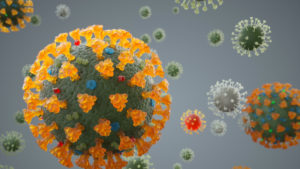The healthcare winners and losers after COVID-19, and what comes next

Pic: Luis Alvarez / DigitalVision via Getty Images
Fortunes were to be made in ASX health stocks during March and April as investors looked for salvation from the COVID-19 pandemic fears rocking markets.
However, once the two biggest health stocks Resmed (ASX:RMD) and CSL (ASX:CSL) are taken out of the data, Australia’s health sector was just as badly beaten up as the rest of the ASX.
The market capitalisation of the remaining ASX health stocks fell by 16 per cent. The All Ordinaries fell by 24 per cent over that period.
According to a state of the industry report from MTP Connect, a not-for-profit set up to speed up growth in medical technologies, biotechnologies and pharmaceuticals, COVID-19 has been a body blow to the majority of Australia’s health sector.
Small biotechs and medical device businesses, the companies investors are most likely to see on the ASX, alongside companies which weren’t able to engineer a pivot to COVID-19 nor access government subsidies, have been most hit.
But there were some bright sparks — telehealth is an undoubted winner from the rapid shift from face-to-face consultations to dial-ins — and there is a chance Australia could capitalise on its early reopening status to lift the clinical trial industry.
With medical, biotechnology and pharmaceutical companies contributing $5bn to the Australian economy, here are who has won and lost in the wash-up following the pandemic.
Opportunities and winners
Ttelemedicine will be remembered for its podium finish this year.
Aided by an extra $699m in government funding, companies such as Medadvisor (ASX:MDR), which automates prescriptions, and 1st Group (ASX:1ST) which runs a telehealth software platform have been beneficiaries of a rapid shift over the course of days from face-to-face consults to phone and video calls.
Coviu CEO Silvia Pfeiffer said they went from about 300 consults a day on their video software in March to 10,000 in the space of a week.
Morgans analyst Scott Power has been very bullish on telehealth saying COVID-19 sped up a trend already in motion, one that also includes tele-radiology plays like Volpara (ASX:VHT) and diagnostics like Resapp (ASX:RAP).
The MTP report listed remote access to data for clinical trial teams, the introduction of remote/at-home monitoring of patients, the introduction of a COVID-19 tracking app, and the ability to e-sign documents as examples of how in just four months Australia’s health sector had digitised.
“An ongoing accelerated rate of adoption of digital health innovation will be critical to drive productivity gains,” it said.
Attracting new business for the once-vibrant clinical trials industry is now a possibility.
Medicines Australia CEO Elizabeth de Somer said in the MTP report Australia’s successful pandemic management meant there was a greater opportunity to attract trials that would otherwise have taken place in the US, Spain, Italy and Germany
She told Stockhead COVID-19 was a chance to revamp the local industry.
“This is an opportunity for the commitments to a harmonised, streamlined process for clinical trials to be front and centre. We want to minimise the barriers to conducting clinical trials and this is an ideal time to look at those,” she said.
COVID-19 wasn’t good, wasn’t bad, just OK
Companies reliant on elective surgeries, such as Cochlear (ASX:COH) for hearing implants and the IVF players, suffered during April and May until restrictions began to lift, and the rush on pharmaceuticals wasn’t all good for distributors.
Antibiotics and respiratory drugs were in hot demand in March as buyers stockpiled.
“This panic buying behaviour has resulted in an increase from 460 to 590 medicines shortages (a 26 per cent increase) in the period from March to May 2020 versus the same period last year,” the report said.
Air freight costs have risen three to 10 times as much international freight is taken on passenger planes, a cost that hasn’t been passed on to the end buyers, and there is likely to be a long demand slump for distributors like Sigma (ASX:SIG) and Australian Pharmaceutical Industries (ASX:API) as people work through their enlarged medicine cabinets.
Not in the ICU, yet
Small biotechs working on preclinical research or running clinical trials and pre-revenue medtechs were the worst affected.
Unable to access the Jobkeeper wage subsidy because they’re pre-revenue, a sharp drop off in funding unless able to tap the ASX, and costly delays or cancellations of clinical trials have put the financial viability of companies in this sector at risk.
Hundreds of clinical trials in Australia and New Zealand were delayed or cancelled in March and April as COVID-19 lockdowns made it unsafe for patients to visit trial sites, hospitals diverted beds and staff to pandemic readiness, and researchers were restricted from travel.
A small number of companies, including Cynata (ASX:CYP) and Neuren Pharmaceuticals (ASX:NEU), are both relaunching trials now.
The MTP report found that 57 per cent of surveyed digital health and medtech companies struggled for funding. For listed companies the capital raising cascade continues, but that money tree won’t last forever.
What does the future look like?
The outlook for Australia’s medical, biotechnology and pharmaceutical sector is mixed.
The MTP report said 20,000 jobs are expected to be lost at key research organisations over the next 12-14 months. A smaller pool of researchers means less research available to be commercialised. The pipeline of drugs, devices and services to be developed is likely to slow over the next year.
Most expect the impact on clinical trials to unwind over the next six months or more, as would problems with supply chains and accessing facilities.
The impact on R&D funding and end user demand for products and services are expected to last even longer, between nine months to over a year.
Companies are also concerned their R&D tax incentives could be at risk as well. While the levels for clinical trial research wasn’t affected by the 2019 changes, pharmaceuticals and device research was.
“Many in the sector are concerned about the longer term impact of COVID-19 on the government budget position and whether this will translate into reductions in funding and savings measures from the sector into the future,” the report said.
“R&D tax incentives were adjusted for FY2020 and organisations have expressed concern that reimbursement for pharmaceuticals and devices through the MBS, PBS and prostheses list will be affected without HTA justification as a means to reduce the budget deficit.”
Related Topics
UNLOCK INSIGHTS
Discover the untold stories of emerging ASX stocks.
Daily news and expert analysis, it's free to subscribe.
By proceeding, you confirm you understand that we handle personal information in accordance with our Privacy Policy.








